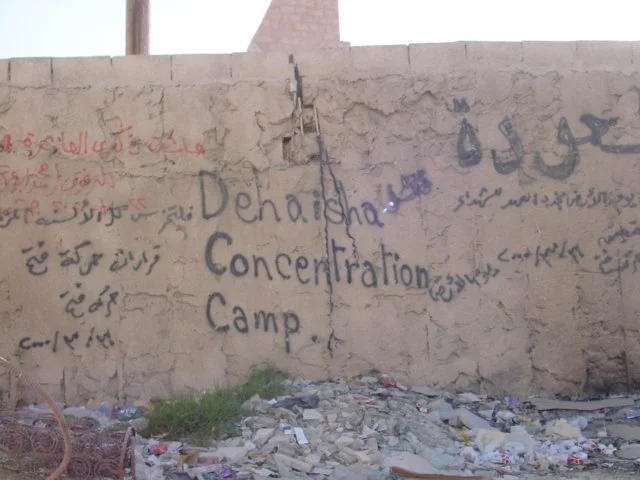July 29, 2001
Beautiful artwork depicting the angels’ appearance to the shepherds.
All of us headed to Beit Sahour today, the site of the Christmas shepherds' field (Beit Sahour means "house of the night watch"). After worship we gathered for fellowship with the priest, Abuna Majdi, and the Peachtree folks as they brainstormed together, creating a vision for their new sister church relationship.
Fr. Magdi and the delegation from Peachtree Presbyterian Church.
The Israeli-only settler bypass road runs right next to our lunch host’s home.
We were then treated to a huge lunch spread by one of the members of the church (his sister lives in Zababdeh, of course!). He's building a new house on his family's land (without permits from the Israeli military who control the land - building permits take years and years, if they are awarded at all). From his balcony, we could see the Israeli bypass road leading up to the half-finished Har Homa settlement (his house is in its shadow). We don't envy his position in the coming years when this settlement is finished.
The Har Homa settlement monstrosity looms over our lunch host’s home.
All day long, snippets of news were coming from Jerusalem - the Temple Mount Faithful trying to place a 4 1/2 ton cornerstone for the Temple on the site of the Dome of the Rock, Palestinians throwing stones on worshippers at the Wailing Wall, Israeli police raiding the Haram al-Sharif (the site of the Dome), reactions all over the West Bank - none of it as bad as its potential, but certainly not helpful.
The narrow, crowded streets of Dheisheh Refugee Camp.
In the afternoon we took a tour of Dheisheh Refugee camp. This camp of 11,000 people (6,000 of whom are children) has been here since refugees started pouring in during the war of 1948. People come from dozens of destroyed Arab villages that now lie inside Israel. For four years people lived in tents before the UN built concrete-walled hovels for them. Some people have been able to build nice places in the camp in the ensuing forty years, but most people live in pretty poor conditions.
This gate was once the only entrance/exit to Dheisheh Refugee Camp.
In 1987, during the first Intifada, the entire camp was surrounded by a twenty foot concrete and barbed wire wall, and all of its entrances were closed off. There was one opening, a grilled revolving door gate, manned by the Israeli army. The gate remains a memorial to those years, and to the hope that they can return to their villages.
Arabic and English graffiti adorn the wall in Dheisheh.
There is a real pride in their Refugee status, as was evident in the eloquent young men who led us around - volunteers at IBDAA Center for the Development of Children's Skills and International Cultural Exchange. For all we had heard about the radicalism of refugee camps, it was certainly surprising to hear rather moderate - yet uncompromising - rhetoric. There's no shortage of idealism here, where even under the Palestinian Authority they are not quite at home.
Dinner beneath the Bedouin Tent restaurant.
We finished off the day back at the Bedouin tent, which was completely full of people eating and smoking 'argila (water pipes).








